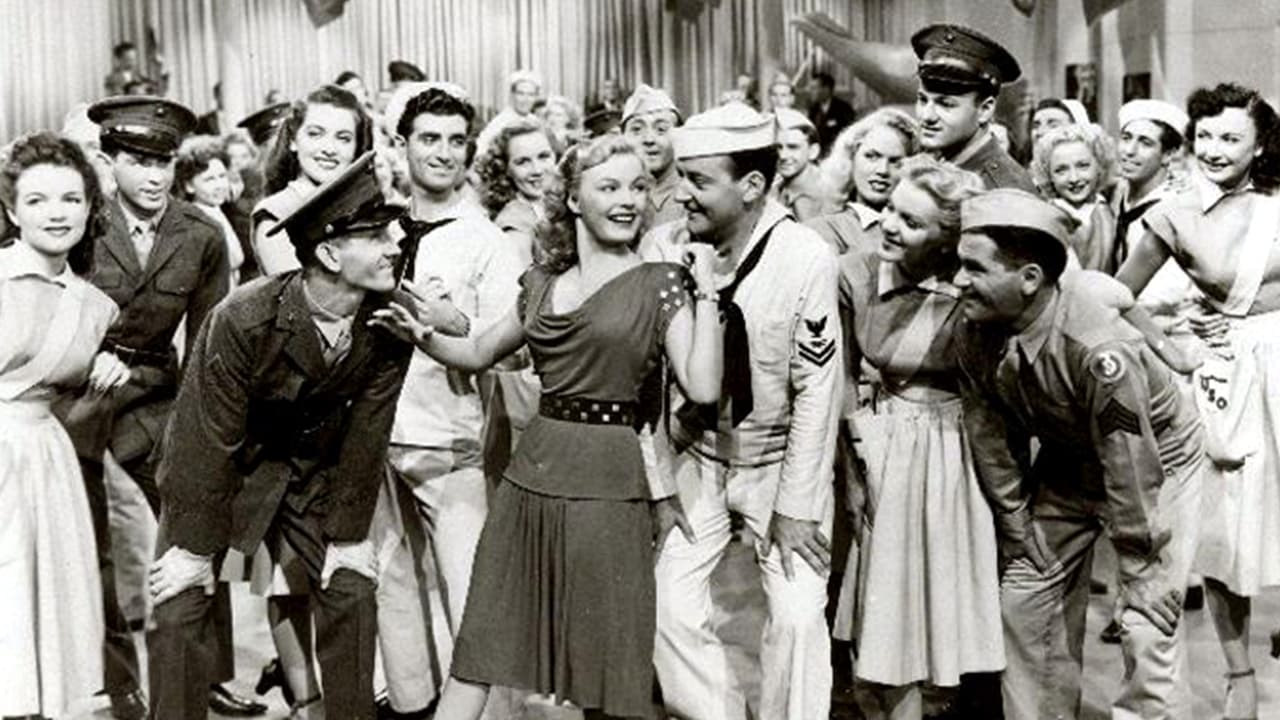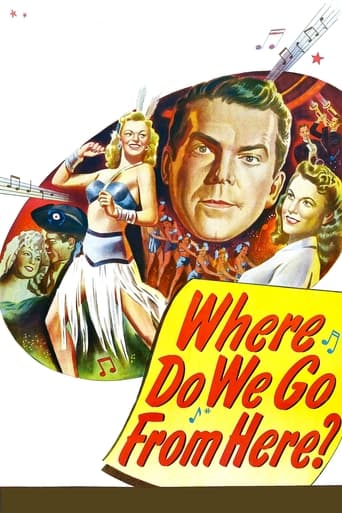

"Where Do We Go from Here" is a comedy, fantasy and musical that started out with a huge cast – with many small parts, but finished somewhat smaller. One can tell by the missing people from the cast list, and from the choppiness of the screenplay. The plot is OK and allows for Fox to use multiple wardrobes during this film. But there must have been quite a lot cut from the film. Fred MacMurray is Bill Morgan, Joan Leslie is Sally Smith and June Haver is Lucilla Powell. They form the core of the various scenarios this script takes us through. Ira Gershwin wrote the lyrics for the songs by Kurt Weill. These are some of the best parts of the film. The performers all are good, and the film has light comedy. The funniest song is "Nina, The Pinta and the Santa Maria." The best lines happen when Bill is transported back to the pilgrim days of America. Bill asks a passer-by the name of the girl in the park, and the gent doesn't understand Bill's 20th century English. So he tries again, "In the park, a girl there is sitting. Her name, me you could tell?" The gent answers with a nod and smile, "Katrina." After resolving a major problem over Manhattan Island (can anyone guess), Bill tells Katrina, "See it now, I can. For me in the whole world, the only girl you are." Katrina, "So glad I am. But, change your mind, what made you?" Actually that sounds like something from the future as well—well, the past future. Doesn't it sound a lot like Yoda in the Star Wars films?This is light entertainment that some will enjoy. Others may be bored or soon lose interest.
... View MoreFred MacMurray plays a guy who wants to do his patriotic duty and join the Army but he's 4F so they won't take him. To make matters worse, the girl he loves (June Haver) only dates soldiers. One night Fred frees a genie from a lamp and the genie grants him wishes in return. He wishes to be in the Army but the genie misunderstands and sends him back in time to join the Army of George Washington. From there, Fred bounces around in time to earlier points in American history where he sails with Columbus, buys Manhattan from Anthony Quinn, and hangs around with Dutch settlers who talk like Yoda. Well this was an interesting little gem I'd never heard of. It's a pleasant Technicolor musical comedy with songs by Ira Gershwin and Kurt Weill. Fred MacMurray is amiable and easygoing. Joan Leslie is lovable as the girl best friend that is, of course, perfect for Fred but he doesn't see it yet. June Haver does fine in a role that would be easy to hate in a more serious movie. Fred and June met while making this and were later married. The songs are cute but nothing terribly impressive. Wait until you see MacMurray dance. Don't quit your day job, Fred! The Christopher Columbus operetta is probably the highlight. Enjoyable wartime fantasy that's very light and charming. Fun but never quite as good as it seems like it could be. Still, if you're a fan of the stars or old-school musicals you should like it.
... View MoreWhen macho Fred MacMurray learns he's been declared "4-F" for military service (reduced to working in a metal recycling plant), his ego is greatly damaged, especially when the girl he loves (Joan Leslie) keeps turning him down for dates with men on active duty. With the help of a mischievous genie (Gene Sheldon) he locates in an antique bottle, he gets into the line of active duty: As a crew member on one of Christopher Columbus's ships, as a soldier at Valley Forge, and as a spy trying to get information from the German army for none other than George Washington himself. Sheldon's time travel device keeps him going further back in time from the Revolutionary War times to Manhattan Island when it was New Amsterdam. Scenes of the Native American dominated New York City are filled with "Airplane!" style humor, previously popularized in "Hellzapoppin'!" which includes deer stopping for traffic lights, a forest which has cross-streets posted for 42nd and Broadway, and natives who sell him Manhattan then set off in search of a fool dumb enough to buy Brooklyn.It is this fluffy, fun attitude which makes this an absolute crowd-pleaser, and while you won't go home singing songs about Columbus's crew insisting that the world is flat, you won't hold your nose at them either. That production number is done in almost opera style with music by Kurt Weill and lyrics by Ira Gershwin who contribute different styles of music for each era that the film explores. Alan Mowbray is imperiously funny as George Washington (being warned by MacMurray about his companion, Benedict Arnold), and Anthony Quinn makes a cameo as a Native American who bamboozles MacMurray into buying property which he will utilize centuries later in order to keep girlfriend Leslie's look-alike from marrying someone she doesn't love. Leslie and June Haver (MacMurray's real-life wife) show up as several different characters, throwing confusion into MacMurray's way, but delight for the audience.
... View MoreWartime patriotism and escapism blend together in this amiable, but unspectacular musical. MacMurray is a towering, ostensibly-hearty man who is graded 4-F by the government and thus cannot enter the Armed Forces during WWII. He wants nothing more than to join up and beat the "Japs" (with the possible exception of wooing Leslie.) One evening, while helping an old woman with some scrap metal, he resurrects a genie who, in gratitude, grants him several wishes. His primary wish, to be in the service, sends him reeling back in time to the Revolutionary War, where he is serving under George Washington! This sort of thing continues as he finds himself on Columbus's flagship, on the island of Manhattan back when it was Indian territory and in Puritanical times. (Interestingly, the Civil War is left out.) In all the time frames, he sees various incarnations of the two ladies (Leslie and Haver) he has flirtations with in 1945. Finally, the genie assists him back to the 20th century where he hopes to somehow enlist in the Army. MacMurray is a friendly, easy-going presence and has a nice enough, if not amazing, singing voice. The ladies are attractive and sing well, but are not particularly distinctive. The best singing in the film comes from the rich-toned Ramirez who threatens mutiny on Columbus in a mini-operetta. The humor is light and simple-minded. The film never aspires to be anything other than morale-building froth, which is what the country needed at the time. Though most of the music is pretty enough and the costumes and sets are colorful, there isn't really anything overly memorable or striking about the film. Apart from the Columbus section, the only really zippy part is a number in a canteen with all the branches of service and Leslie daringly dancing on barstools. Still, it's an easy, appealing movie that has variety, if nothing else. MacMurray infiltrates a German beer hall (which is presented as rather charming in spite of the fact that the US was at war with Germany at the time!) and imitates Adolph Hitler at one point. Quinn shows up as a "Me Indian Chief" sort of Native American character (while Leslie dons what had to be an eye-opening, for 1945, two-piece costume.) The film has some fairly innovative opening credits and some fairly decent (for the time) special effects. Coincidentally, MacMurray later married Haver in real-life (after her short-lived stint in the convent) though here he is more after Leslie. Ironically, Haver and MacMurray adopted twins while Leslie had a set of her own naturally. One note: The first poster seems to have mistaken "uncredited" for "scenes deleted". While a section featuring Roy Rogers and Gabby Hayes was cut, that was basically it. Most of the performers listed after were just actors whose names failed to appear in the credits. They didn't have particular sequences that were cut.
... View More